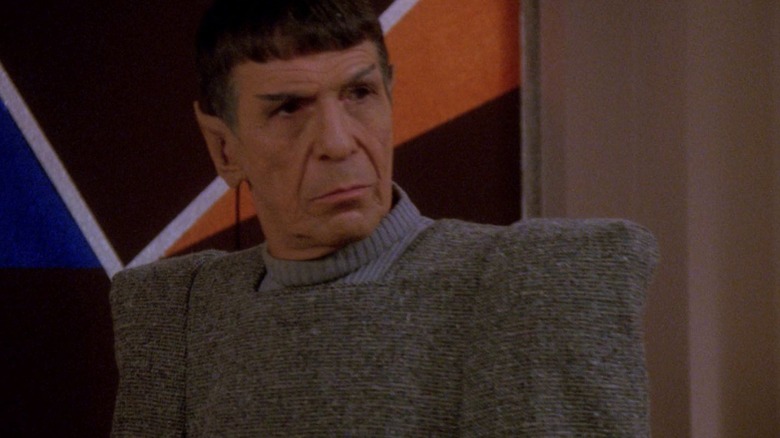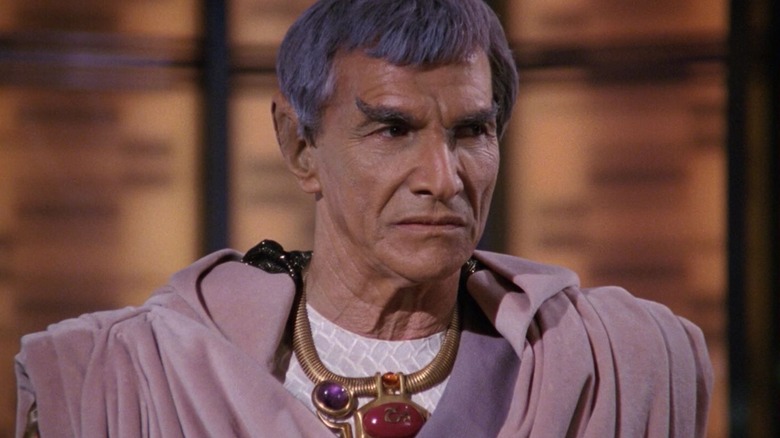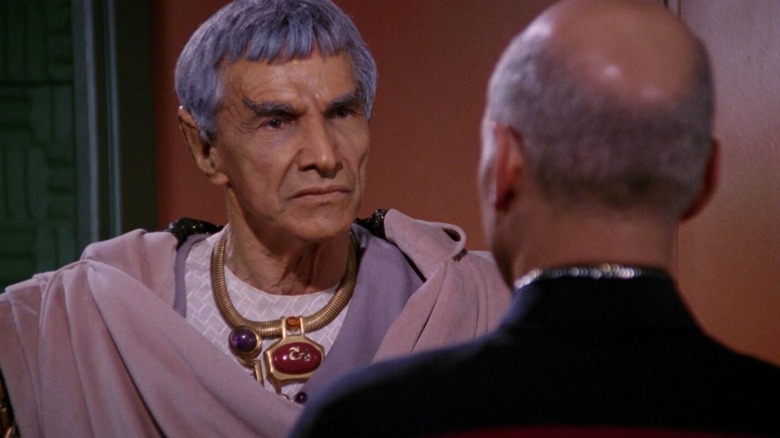Star Trek: The Next Generation's Spock Ban Created A Nightmare For The Writers
When Gene Roddenberry was writing the series Bible for "Star Trek: The Next Generation" back in 1986, he had several strict rules that writers had to follow. Most frustrating of these rules — sometimes just called the Roddenberry Rule — was that no episodes could center on the show's main characters having personal disagreements. In Roddenberry's view, all the workers on a Federation starship had to get along, or at least responded to each other with nothing less than 100% authentic professional courtesy. Writers hated the Roddenberry Rule, as they felt the best way to generate drama was by inventing interpersonal conflict. By deliberately taking away interpersonal conflict, Roddenberry was creatively hamstringing them.
Roddenberry also wanted "Next Generation" to be a cleaner, purer version of the original "Star Trek" he launched 20 years earlier. He wanted to be wholly in charge this time, and dictate every minutiae of the series. This often caused a lot of misery behind the scenes, as other showrunners, writers, lawyers, and actors all vied for their versions of control. Roddenberry also wanted "NextGen" to be unique, pointedly scrubbing it of all the old "Star Trek" characters and familiar aliens.
Klingons, he said, were not allowed to be the show's central antagonists, nor were Romulans. Vulcans, popular in the original series because of Spock (Leonard Nimoy) weren't to be a regular part of the show. It was to be all-new territory.
In the oral history book "The Fifty-Year Mission: The Next 25 Years: From The Next Generation to JJ Abrams," edited by Mark A. Altman and Edward Gross, writer Ira Steven Behr went on record with how frustrated he was with the above limitations, and was particularly miffed by one rule in particular. It seems that no one was permitted to say the word "Spock."
But... Sarek is Spock's dad!
Behr's frustrations were particularly pronounced while he was working on the episode "Sarek" (May 14, 1990). In the episode, Sarek (Mark Lenard) was on board the U.S.S. Enterprise-D for an important diplomatic mission. Sarek was also secretly suffering from a rare Vulcan brain condition that very elderly people experience on his home planet. The condition, Bendii Syndrome, psychically affected everyone in the vicinity. Sarek would have to shunt all his negative emotions into Picard (Patrick Stewart), via mind-meld, for the mission to be carried out.
Trekkies will immediately tell you that Sarek is Spock's father, and that Lenard played the part on the original series. Roddenberry, however, was adamant about not using the name "Spock" on "Next Generation," a rule that was being stringently enforced by "NextGen" executive producer Rick Berman. For them, the line was incredibly clear. For Behr, it was merely the executives being obtuse. Behr recalled with frustration:
"When we did the 'Sarek' rewrite, the fight over the word 'Spock' was insane. I was absolutely not allowed to use the word 'Spock.' Rick made a big issue of it and said we can't do it. There's no way. We did it once. We had McCoy show up at the beginning, but no more. No references to the original series. I said, 'It's Spock's father, we're already in that territory.' He said, 'Absolutely not.'"
Behr was referring to the "Next Generation" pilot episode "Encounter at Farpoint," which featured a cameo from Dr. McCoy (DeForest Kelley) from the original "Star Trek." McCoy was 137 years old, and Kelley was buried under old-age makeup. His presence was the only bridge Trekkies were to have to the previous series. After that, "Next Generation" had to stand on its own.
But the "don't say Spock" rule was too much.
Don't say Spock
Behr then recalled how he was able to get around the Spock rule, although it involved catching Berman off-guard. When a "Next Generation" script was written, it went to Berman's office for notes. Berman, wanting to remain as strict as Roddenberry, often marked up teleplays to no end, something the writers of "Next Generation" weren't always fond of. Behr and the rest of the writing staff had been called in for one of Berman's note-explaining sessions, one a completely different script than "Sarek." Then, when the conversation was on something else entirely, Behr brought it back to Spock.
The ploy worked. Behr recalls:
"We were talking about something, and it was kind of benign, and I just suddenly said to him, 'Rick, tell me again, why can't we say the word Spock?' And his whole body language changed, he leaned back in his chair and flung his hands up behind the back of his head, and I could tell he did not want to have this discussion again. But he couldn't think of a reason at that very moment, and he just said, 'okay, you can say it once.' It was ridiculous."
Sarek said "Spock," and all was well. It seemed like a moot point a few years later with the airing of the two-part episode "Unification" (November 4, 1991). That episode featured Picard and Data (Brent Spiner) going to the enemy planet of Romulus to aid a reunification between that world and the Vulcans, once allies. Overseeing the reunification was Spock himself, played by Nimoy. It seems that Spock was just very long-lived, and survived into the "NextGen" era.
You can be damn sure they said "Spock" numerous times in "Unification."


